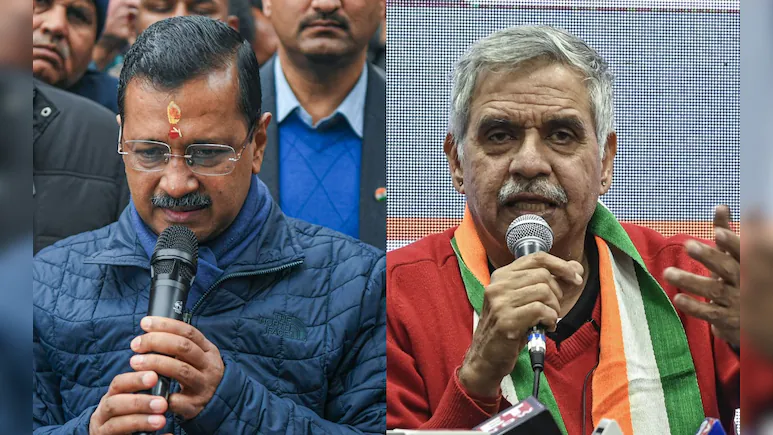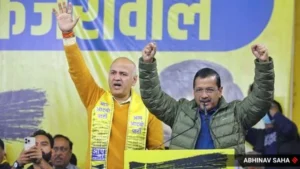Delhi elections 2025: A Threat to Its Political Future

Delhi elections 2025
AAP’s Philosophical Predicament: The Test of Adjusting Adaptability and Consistency
The Aam Aadmi Party (AAP), drove by Arvind Kejriwal, has for some time been known for its flighty way to deal with legislative issues. Rising up out of the counter debasement development of 2011, the party immediately acquired noticeable quality by situating itself as a boss of administration over the belief system. In any case, this very adaptability, which once helped it out, presently represents a test as AAP battles to keep a reasonable political character in the midst of developing examination and discretionary misfortunes.
The Ascent of AAP: From Activism to Administration
AAP was established on the commitment to clean administration, straightforwardness, and favorable to individual arrangements. In contrast to conventional ideological groups with distinct philosophical positions — like the conservative Bharatiya Janata Party (BJP) or the middle-left Congress — AAP embraced a down-to-earth approach, drawing strategies from the two finishes of the range. Kejriwal himself once expressed, “In the event that we find an answer on the left, we take it from that point. In the event that we think that it is on the right, we take it from that point.” This philosophical adaptability permitted AAP to speak to an expansive citizen base and immediately gain constituent progress in Delhi.
AAP’s initial administration model, focused on free power, further developed medical care, and great government-funded schooling, won broad help. The party’s outcome in Delhi established the groundwork for its venture into Punjab, where it got a critical triumph in the 2022 gathering decisions. This extension prompted trust that AAP could arise as a public option in contrast to the BJP and Congress.
The Expense of Philosophical Vagueness
While AAP’s administration’s first methodology assisted it with ascending to drive, it has additionally prompted developing analysis. Numerous political examiners contend that the party comes up short on the clear philosophical establishment, making it hard to anticipate its position on significant public issues. This has brought about allegations of advantage, where AAP seems to move positions in light of discretionary accommodation as opposed to standard.
One illustration of this was Kejriwal’s public recitation of the Hanuman Chalisa during the 2020 Delhi Gathering decisions. The move was viewed as an endeavor to counter BJP’s Hindutva story and draw in Hindu citizens. Simultaneously, AAP has situated itself as a boss of the Dalit cause, summoning B.R. Ambedkar’s heritage. These apparently disconnected procedures have driven pundits to address whether AAP represents a specific belief system or basically embraces various stories in view of political need.
Further entangling its position is the party’s uncertain position on public issues, such as Kashmir, Article 370, and international strategy. Not at all like Congress and BJP, which have clear situations on these issues, AAP has to a great extent stayed quiet or taken center-ground positions, supporting the insight that it tries not to take firm stands.
Kejriwal’s Lawful Inconveniences and AAP’s Future
AAP’s philosophical difficulties have been additionally exacerbated by Kejriwal’s new lawful difficulties. His capture in Walk 2024 regarding the Delhi alcohol strategy case was a significant catastrophe for the party. Despite the fact that he was allowed bail following five months, the contention debilitated AAP’s believability. The BJP utilized the episode to name AAP as a bad party, a story that built up momentum among electors.
During Kejriwal’s nonappearance, Atishi Marlena was selected as the Boss Priest of Delhi. While she figured out how to keep the party intact, AAP’s discretionary execution endured. The 2025 Delhi races saw AAP losing its greater part, with Kejriwal himself confronting a stunning loss in the New Delhi voting public to BJP’s Parvesh Verma. This misfortune denoted a critical defining moment, flagging citizen disappointment and bringing up issues about the party’s future.
Could AAP Figure out Some kind of harmony?
As AAP looks forward, it faces a basic test: how to keep up with its wide allure while fostering a more clear philosophical position. The party’s prosperity up to this point has been driven by its attention on administration and public government assistance plans. Be that as it may, as it tries to extend broadly, it should explain more grounded positions on key political and social issues.
On the off chance that AAP keeps on depending entirely on administration without a characterized philosophical system, it gambles losing elector trust over the long haul. The party should conclude whether it needs to stay an adaptable moderate power or secure itself with a more clear philosophical establishment. The next few years will decide if AAP can defeat this test or whether its philosophical vagueness will turn into a drawn out obligation.
Source: Indian Express








